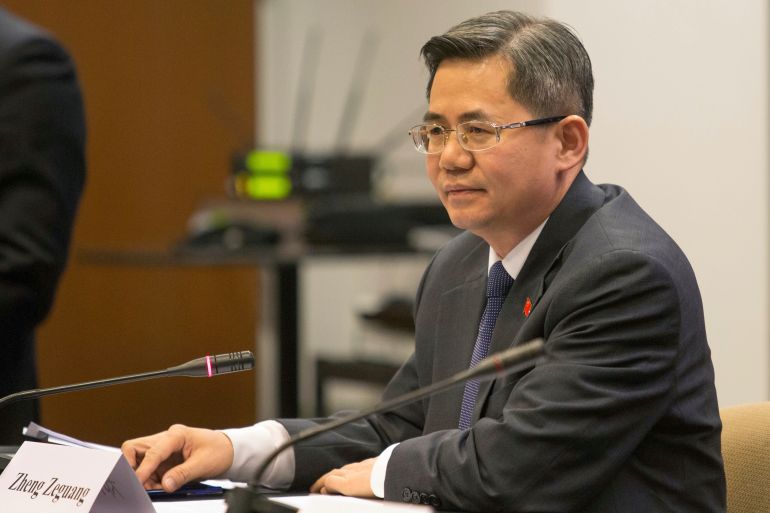UK summons Chinese ambassador after arrest of BBC journalist
The British foreign office rebukes Zheng Zeguang after Ed Lawrence’s arrest and alleged assault in Shanghai.

The United Kingdom has summoned the Chinese ambassador in London for a rebuke after the arrest and alleged assault of a BBC journalist covering protests against Beijing’s zero-COVID-19 policy.
Zheng Zeguang was called in to the foreign office on Tuesday after the incident involving Ed Lawrence in Shanghai, which Foreign Secretary James Cleverly called “deeply disturbing”.
Keep reading
list of 3 itemsChina’s COVID-19 protests: What we know so far
British PM Sunak says ‘golden era’ of UK-China relations is over
“It is incredibly important that we protect media freedom,” Cleverly told reporters at a NATO meeting in Romania, confirming Zheng had been summoned.
“It’s incredibly important that journalists are able to go about their business unmolested and without fear of attack,” the foreign minister said.
Lawrence was hauled away by police on Sunday evening while filming a protest against COVID restrictions, one of many that have rocked China in recent days.
The BBC said he was assaulted by police before being released several hours later.
China hit back against British criticism of the journalist’s treatment and Downing Street’s urging that police show respect towards the COVID protesters.
“The UK side is in no position to pass judgement on China’s COVID policy or other internal affairs,” an embassy spokesperson said before Zheng was summoned, noting Britain’s high pandemic death rate.
The government in London this month also expressed concern over reports that Beijing has been operating undeclared police outposts in foreign countries, including Britain.
A senior Chinese diplomat was summoned to the foreign office last month after his consulate colleagues in Manchester in northwest England were accused of beating up a Hong Kong pro-democracy protester.
The incidents have fuelled political pressure on the new government of Prime Minister Rishi Sunak to get tough with China.
But Sunak is treading a fine line between defending freedoms and antagonising the world’s second-biggest economy.
In a speech on Monday, he described the “golden era” of UK-China relations declared by former Prime Minister David Cameron as “over”.
But Sunak also called for “robust pragmatism” in dealing with Britain’s competitors, disappointing critics who want him to go further in confronting Beijing.
Changes on the business front
Separately on Tuesday, the UK removed the Chinese nuclear firm CGN from construction of its new Sizewell C nuclear power station, which will now be built only with French commercial partner EDF.
That decision was taken after UK government departments were ordered last week to stop installing Chinese-made surveillance cameras at “sensitive sites”.
The week before, a Chinese company was ordered to sell most of its majority stake in Britain’s biggest semiconductor maker, Newport Wafer Fab.
A spokesman for Sunak declined to say if national security factors drove the decision on CGN.
But he told reporters: “Certainly we think it’s right that the UK has more energy security, energy independence.”